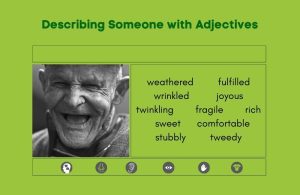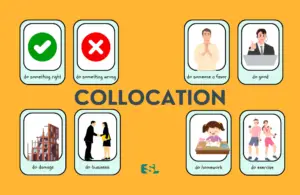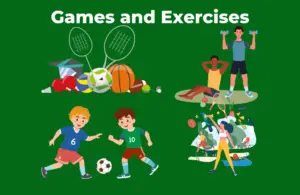This article covers the following areas –
- Research Terminology
- Argumentative Writing
- Literary Analysis
- Historical Discussions
- Mathematical Language
- Sample Conversation Using Vocabulary for Academic Success
- Final Note
- FAQ: Vocabulary for Academic Success
Academic success isn’t solely about understanding concepts or having a high IQ; it also leans heavily on one’s ability to communicate ideas and knowledge effectively. A strong academic vocabulary forms the foundation of coherent arguments, clear explanations, and insightful discussions.
This article will introduce many terms and phrases that are pivotal for students and academicians across disciplines. Understanding and using these terms can elevate your academic writing and discussions.
Research Terminology
Engaging with or conducting research requires an understanding of specific terminology.
| Word/Phrase | Meaning/Usage | Example Sentences |
|---|---|---|
| Hypothesis | A proposed explanation made on limited evidence | “The hypothesis was tested through various experiments.” |
| Qualitative | Relating to descriptive data | “She conducted a qualitative analysis of the responses.” |
| Quantitative | Relating to numerical data | “The study was primarily quantitative in nature.” |
| Variables | Elements that can be changed or varied | “There were too many variables to consider in the experiment.” |
| Methodology | A system of methods used in a study | “The methodology section outlines the research process.” |
| Control group | Group in an experiment without the factor being tested | “The control group showed no change in behavior.” |
| Sample size | Number of participants in a study | “A larger sample size would make the findings more reliable.” |
| Bias | Prejudice in favor or against a thing/person | “Researchers must avoid bias in studies.” |
| Peer-reviewed | Evaluated by professionals in the field | “The article was peer-reviewed before publication.” |
| Literature review | Comprehensive survey of existing research | “Her literature review highlighted all major studies on the topic.” |
| Data | Factual information used for analysis | “Raw data was processed to derive meaningful conclusions.” |
Argumentative Writing
Presenting arguments in academia needs a structured approach and specific vocabulary.
| Word/Phrase | Meaning/Usage | Example Sentences |
|---|---|---|
| Thesis statement | Main claim or argument of a work | “The thesis statement is clear and concise.” |
| Evidence | Information supporting an idea | “He provided ample evidence to back his claims.” |
| Counterargument | Argument against the main idea | “Considering the counterargument is essential for a balanced essay.” |
| Rebuttal | Refuting a counterargument | “Her rebuttal to the opposition was compelling.” |
| Stance | Position or opinion on an issue | “He took a firm stance on environmental conservation.” |
| Validate | To confirm or corroborate | “She used case studies to validate her points.” |
| Perspective | A particular way of considering something | “From a historical perspective, the event takes on different significance.” |
| Assertion | A confident statement of fact or belief | “His assertion was challenged by many.” |
| Premise | A basic idea that forms the basis for a theory | “The premise of his argument was fundamentally flawed.” |
| Synthesize | Combining various sources of information | “She synthesized various scholars’ views in her paper.” |
| Rhetoric | Art of persuasive speaking/writing | “His rhetoric was powerful and convincing.” |
Literary Analysis
Dissecting literature requires a set of specialized terms to discuss nuances.
| Word/Phrase | Meaning/Usage | Example Sentences |
|---|---|---|
| Protagonist | Main character in a story | “The protagonist’s journey is central to the plot.” |
| Antagonist | Opponent of the protagonist | “The antagonist’s motives were questionable.” |
| Theme | Main idea or underlying message | “The theme of love is prevalent in the novel.” |
| Symbolism | Use of symbols to signify deeper meanings | “The river’s symbolism in the story is multifaceted.” |
| Motif | Recurring element with significance | “The broken mirror is a motif throughout the play.” |
| Allegory | A story with a hidden meaning | “The tale was an allegory for societal collapse.” |
| Characterization | Process by which a character is portrayed | “The author’s characterization was vivid and detailed.” |
| Irony | A situation where the opposite of what you expect occurs | “The irony of the ending was not lost on readers.” |
| Metaphor | Figure of speech comparing two things | “The world is a stage, is a famous metaphor.” |
| Foreshadowing | Hinting at future events | “The storm clouds were foreshadowing the tragedy to come.” |
| Imagery | Descriptive language that evokes sensory experiences | “Her imagery painted a vivid picture in the reader’s mind.” |
Historical Discussions
Historical discourses often utilize specific terminology to explain events and eras.
| Word/Phrase | Meaning/Usage | Example Sentences |
|---|---|---|
| Epoch | A period in history or a person’s life | “The Renaissance was an epoch of great cultural achievement.” |
| Chronology | Arrangement of events in time | “The chronology of events was meticulously detailed.” |
| Artifact | Object made by a human, typically historical | “The museum displayed artifacts from ancient Egypt.” |
| Dynasty | A series of rulers from a single family | “The Ming dynasty ruled China for centuries.” |
| Revolution | A significant change or overthrow of a system | “The French Revolution brought vast changes to society.” |
| Regime | A government in power | “The regime was known for its oppressive policies.” |
| Colonialism | Control by one country over another | “The impacts of colonialism can still be felt today.” |
| Primary source | First-hand account of an event | “Diaries are valuable primary sources for historians.” |
| Secondary source | Interpretation of primary sources | “Her book, a secondary source, analyzes letters from the war.” |
| Treaty | Formal agreement between countries | “The treaty ended decades of conflict.” |
| Historiography | Study of historical writing | “His focus was on the historiography of the medieval era.” |
Mathematical Language
Mathematics, while numeric, also employs specific verbiage to describe concepts and processes.
| Word/Phrase | Meaning/Usage | Example Sentences |
|---|---|---|
| Variable | An element that can take on different values | “Let x be the variable in the equation.” |
| Equation | A statement that two things are equal | “The equation balances when both sides equal 5.” |
| Theorem | A general proposition proved true | “Pythagoras’ theorem is fundamental in trigonometry.” |
| Function | Relation between a set of inputs and outputs | “The function f(x) defines how x is transformed.” |
| Integer | A whole number | “The value must be an integer, not a fraction.” |
| Derivative | Rate at which a function changes | “The derivative gives the slope of the tangent line.” |
| Integral | The opposite of a derivative | “Finding the integral can determine the area under a curve.” |
| Matrix | A rectangular arrangement of numbers | “The matrix can be used to represent systems of equations.” |
| Geometry | Study of shapes and their properties | “Geometry deals with points, lines, and planes.” |
| Probability | Measure of the likelihood of an event | “The probability of the event occurring is 0.5.” |
| Algorithm | A set of rules to solve a problem | “The algorithm quickly sorts the data.” |
To elevate your vocabulary in just 30 days, I recommend to my students an informative, fun, and accessible guide to utilizing powerful language. Millions of individuals have enhanced their academics, job skills, and confidence by dedicating just fifteen minutes daily to the exercises and tests of 30 Days to a More Powerful Vocabulary (Amazon Link), a top-selling. It offers step-by-step methods to bolster language prowess, discover compelling words, and daily vocabulary enhancement with pronunciation guidance.
Sample Conversation Using Vocabulary for Academic Success
Situation: In a university coffee shop, Lisa and Kevin are talking about the importance of academic vocabulary in enhancing the quality of their research papers.
Lisa: Hey Kevin, I recently read an article on vocabulary crucial for academic success. It’s fascinating how using certain key words and phrases can improve the clarity and impact of our papers.
Kevin: That sounds interesting, Lisa. I’ve always felt that my academic writing could use some refinement. What terms did the article emphasize?
Lisa: It highlighted transition words like ‘however,’ ‘furthermore,’ and ‘consequently.’ It also discussed terms used to introduce evidence, like ‘for instance,’ ‘as illustrated by,’ and ‘according to.’
Kevin: Oh, I see. I’ve used some of those, but maybe not as effectively as I could. I guess using these phrases correctly can help make our arguments more compelling?
Lisa: Exactly! The article also mentioned the importance of words that show causation and contrast, which can help structure our arguments better and guide the reader through our thought process.
Final Note
Navigating the world of academia becomes smoother with a robust vocabulary. By familiarizing yourself with these terms and phrases, you arm yourself with the tools necessary for clear, precise, and sophisticated communication in academic circles.
Whether penning a research paper, participating in a debate, or simply engaging in academic dialogue, this vocabulary is a foundational pillar for academic success.
FAQ: Vocabulary for Academic Success
1. What is the significance of transition words in academic writing?
Transition words help guide readers through a text, ensuring that your arguments flow smoothly and are easy to follow.
2. Are phrases like ‘for instance’ and ‘as illustrated by’ interchangeable?
While they can often be used similarly, it’s essential to ensure that the phrase fits the context. Both are used to introduce examples, but their usage can vary based on sentence structure.
3. How do words showing causation enhance an argument?
Words like ‘because,’ ‘thus,’ and ‘hence’ indicate a cause-and-effect relationship, making the reasoning behind an argument clearer to the reader.
4. Why is contrasting vocabulary important?
Contrasting vocabulary, like ‘however’ or ‘on the other hand,’ allows writers to present alternative viewpoints or counterarguments, adding depth to their discussion.
5. Can overusing these key words and phrases be detrimental?
Yes, over-reliance on certain phrases can make writing seem repetitive. It’s essential to strike a balance and use them where they genuinely add value.
6. How can I expand my academic vocabulary?
Regular reading of academic journals, attending seminars, and using resources like academic vocabulary lists or thesauruses can help.
7. Are there specific words to avoid in academic writing?
It’s best to avoid informal language, slang, or overly subjective terms unless they are relevant to the topic.
8. How does a varied vocabulary benefit academic writing?
A diverse vocabulary allows for more precise and nuanced expression, making arguments more compelling and the writing more engaging.
9. Are there tools to help refine academic vocabulary in writing?
Yes, tools like Grammarly or the Academic Phrasebank can offer suggestions and alternatives for enhancing academic vocabulary.
10. How important is it to understand the context when using academic vocabulary?
Understanding context is crucial. Using sophisticated vocabulary incorrectly can confuse readers and weaken the credibility of your argument.






